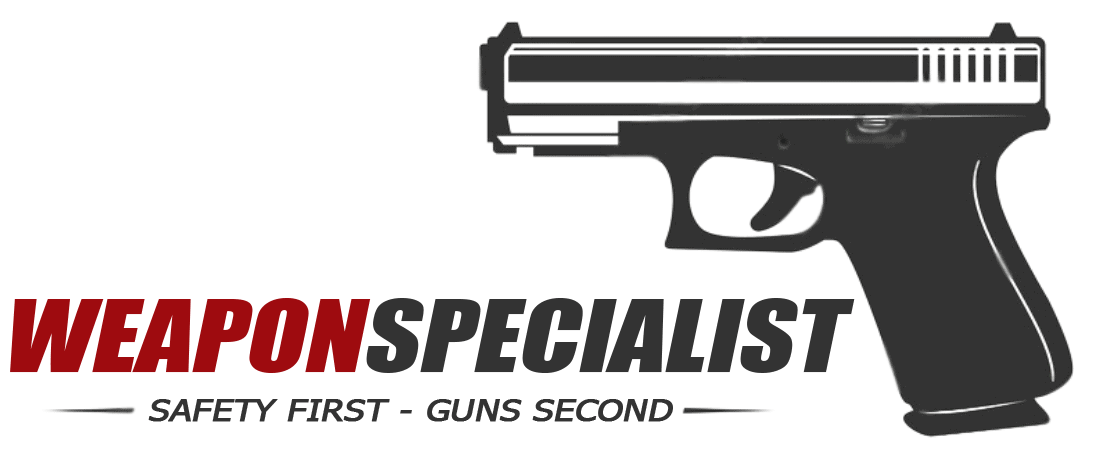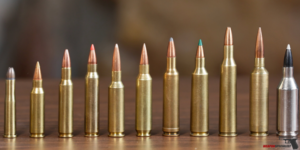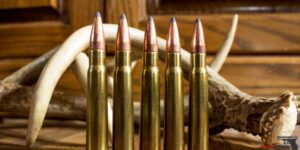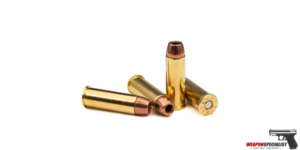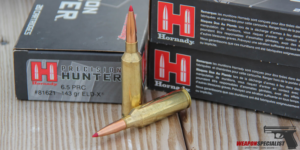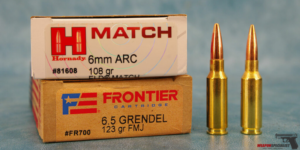The world of firearms offers a vast array of choices, and one of the most common debates among gun enthusiasts is the comparison between the .380 ACP and the 9mm Luger (9mm Parabellum).
Both calibers have their strengths and weaknesses, and understanding their differences can help you make an informed decision when it comes to selecting the right firearm for your needs.
In this article, Weapon Specialist will delve into the details of the 380 vs 9mm debate, examining their ballistics, recoil, ammunition availability, and other factors that play a crucial role in firearm selection.
What is .380 ACP?
The .380 ACP (Automatic Colt Pistol) is a popular handgun cartridge designed by John Moses Browning in 1908. It is also known as 9mm Short, 9mm Kurz, or 9x17mm. The .380 ACP was created as a smaller alternative to the larger and more powerful 9mm Parabellum round.
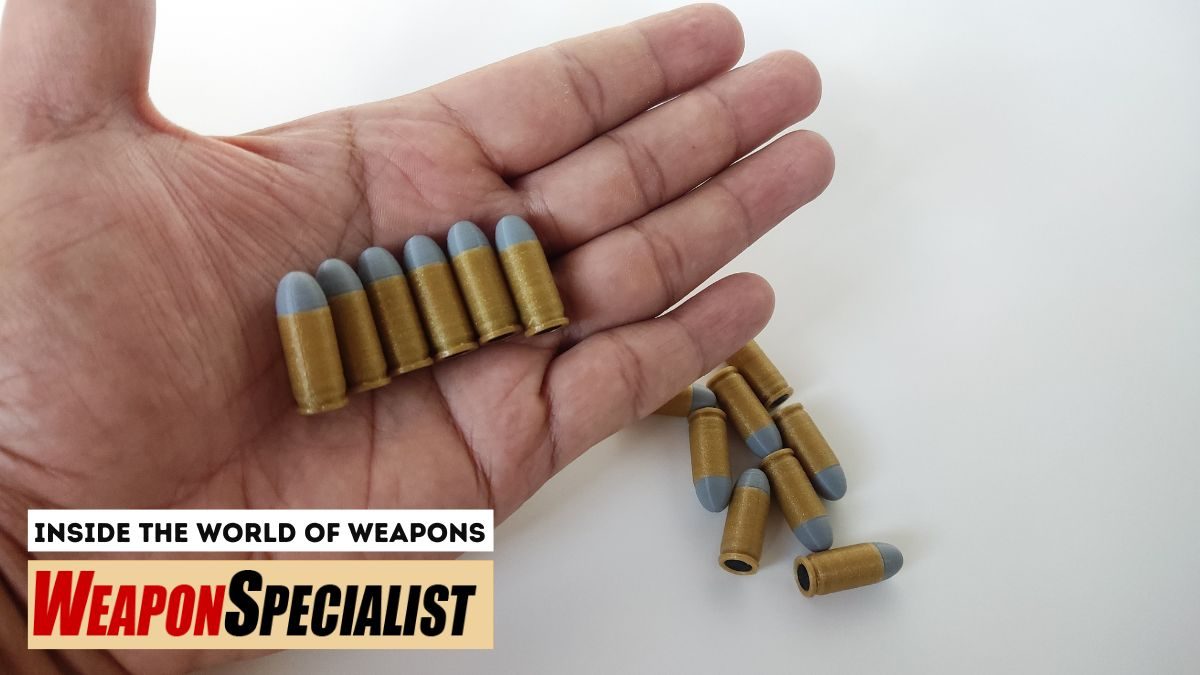
The .380 ACP cartridge is commonly used in compact and subcompact pistols, making it a popular choice for concealed carry and self-defense purposes. It offers a balance between manageable recoil and effective stopping power, making it suitable for shooters who prioritize ease of use and compactness.
The typical bullet weight for .380 ACP ammunition ranges from 90 to 95 grains, with velocities typically reaching around 900 to 1,000 feet per second. While the .380 ACP is not as powerful as larger handgun cartridges, it still provides adequate performance for self-defense scenarios at close to moderate ranges.
It’s important to note that firearm and ammunition compatibility is essential, as not all handguns are chambered to fire .380 ACP. Always consult the manufacturer’s recommendations and use appropriate ammunition specifically designed for your firearm.
What is 9mm Luger?
The 9mm Luger, also known as 9mm Parabellum or 9x19mm, is one of the most widely used handgun cartridges in the world. It was developed by Georg Luger and introduced in 1902 for use in the German Luger semi-automatic pistol.
The 9mm Luger cartridge has a bullet diameter of 9mm and a case length of 19mm, hence the “9x19mm” designation. It is a rimless, centerfire cartridge that is widely available and used in a variety of firearms, including pistols, submachine guns, and carbines.

The 9mm Luger offers a good balance between manageable recoil, high magazine capacity, and effective terminal performance. It is known for its reliability, accuracy, and versatility. The typical bullet weight for 9mm Luger ammunition ranges from 115 to 147 grains, with velocities typically reaching around 1,000 to 1,200 feet per second.
Due to its popularity, there is a wide variety of ammunition options available for the 9mm Luger, including target loads, self-defense rounds, and even +P (overpressure) or +P+ variants, which offer increased muzzle velocity and energy.
It’s important to note that firearm compatibility is crucial, as not all handguns are chambered to fire 9mm Luger. Always consult the manufacturer’s recommendations and use appropriate ammunition specifically designed for your firearm.
Quick Comparison Table Between 380 vs 9mm
| Aspect | .380 ACP | 9mm Luger |
|---|---|---|
| Ballistics | Lower muzzle energy and velocity | Higher muzzle energy and velocity |
| Stopping Power | Effective with proper shot placement | Offers greater stopping power |
| Recoil | Generates less recoil | Generates more recoil |
| Ammunition Availability | Less widely available | Widely available with a variety of options |
| Firearm Selection | Compact and lightweight options | Wide range of options, including full-size and compact |
| Concealed Carry | Easily concealable | Slim and compact options available |
| Training and Practice | Less recoil for beginners | Offers a more realistic shooting experience |
| Cost | Can be more expensive | Generally more affordable |
380 vs 9mm Ballistics
When it comes to ballistics, the 380 vs 9mm comparison reveals some notable differences.
The 9mm Luger, being a larger and more powerful round, generally offers higher muzzle energy and greater velocity compared to the .380 ACP.
This translates into a flatter trajectory, longer effective range, and better penetration.
While the .380 ACP can be an effective self-defense round with proper shot placement, the 9mm Luger offers more stopping power and is commonly used by law enforcement agencies and military organizations around the world.
It delivers a larger wound channel and is more likely to incapacitate an assailant with a single shot.

It’s important to note that modern ammunition technology has improved the performance of the .380 ACP, with some manufacturers offering +P loads that provide increased velocity and energy.
However, even with these advancements, the 9mm Luger still maintains a ballistic advantage over the .380 ACP.
380 vs 9mm Recoil
Recoil is a critical factor to consider when comparing the .380 vs 9mm, as it directly affects accuracy and controllability.
The 9mm Luger generates higher recoil due to its greater muzzle energy, bullet weight, and powder charge. This can result in more pronounced muzzle flip and perceived recoil, especially in lightweight firearms.
On the other hand, the .380 ACP generates less recoil, making it an attractive option for shooters who are sensitive to recoil or prefer firearms with reduced felt recoil.
This makes it a popular choice for individuals who may have difficulty managing the recoil of larger calibers, such as the 9mm Luger.

It’s worth noting that advancements in firearm design and recoil mitigation technology, such as recoil springs and ergonomics, have helped minimize the recoil effects in both calibers. However, the 9mm Luger still tends to generate more recoil than the .380 ACP.
380 vs 9mm Ammunition Availability
Another important aspect to consider when comparing the .380 vs 9mm is ammunition availability. The 9mm Luger has been in production for over a century and is one of the most popular calibers worldwide. As a result, it enjoys widespread availability, with a wide variety of bullet types and weights to choose from.
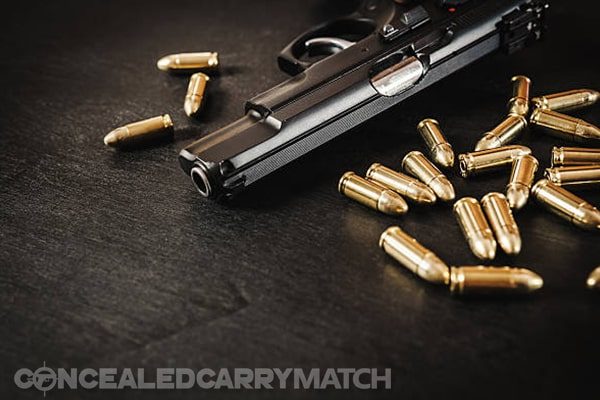
On the other hand, while the .380 ACP has gained popularity in recent years, especially for concealed carry handguns, it may not enjoy the same level of ammunition availability as the 9mm Luger.
However, with the increasing popularity of the .380 ACP, ammunition manufacturers have expanded their offerings, providing a decent selection for this caliber.
It’s essential to consider the availability of ammunition for your chosen caliber, as it affects your ability to train, practice, and find suitable self-defense loads. The 9mm Luger has a clear advantage in this aspect, offering a wider range of ammunition options.
380 vs 9mm Firearm Selection
When it comes to firearm selection, the choice between the .380 ACP and the 9mm Luger depends on various factors, including personal preference, intended use, and individual needs.
It’s important to choose a firearm that fits your hand comfortably, provides good ergonomics, and allows for proper control and accuracy.
For individuals with smaller hands or those seeking a lightweight and easily concealable option, the .380 ACP may be a suitable choice.
Its reduced recoil and smaller frame size make it easier to handle and more comfortable to shoot, especially in compact or subcompact pistols.
However, if you prioritize stopping power, longer effective range, and greater ammunition capacity, the 9mm Luger is likely the better option. It offers a wider range of firearms to choose from, including full-size, compact, and subcompact models.
The 9mm Luger is versatile and widely used in various applications, such as self-defense, competition shooting, and law enforcement.
380 vs 9mm Concealed Carry Considerations
Concealed carry is a popular application for both the .380 ACP and the 9mm Luger, as they offer compact and easily concealable options. When it comes to concealed carry considerations, several factors come into play.
Firstly, the size and weight of the firearm play a significant role in concealability. The .380 ACP, being a smaller caliber, often allows for more compact and lightweight handguns. These firearms are easier to carry discreetly and can be comfortably concealed in various holsters and carry positions.
However, advancements in firearm design have resulted in the availability of compact and subcompact 9mm Luger handguns with excellent concealability.
Many manufacturers offer slim and lightweight models specifically designed for concealed carry, allowing individuals to enjoy the benefits of a more powerful caliber in a compact package.
Additionally, the availability of ammunition designed for self-defense is crucial for concealed carry purposes. Both the .380 ACP and the 9mm Luger have a range of self-defense ammunition options, including expanding hollow point bullets, which are designed to maximize stopping power while minimizing over-penetration.
380 vs 9mm Training and Practice
Regardless of the caliber you choose, training and practice are vital to developing proficiency and confidence with your chosen firearm. It’s essential to become familiar with the recoil, handling characteristics, and operation of your firearm.
The .380 ACP, with its reduced recoil, can be more forgiving for newer shooters or those who may have difficulty managing the recoil of larger calibers. This can contribute to better accuracy and faster follow-up shots during training and practice sessions.
On the other hand, training with the 9mm Luger allows for a more realistic experience, as it closely mimics the recoil and handling of larger calibers.
This can be beneficial if you plan to eventually transition to a larger caliber or if you want to experience a more robust shooting experience during training.
Ultimately, the choice between the .380 ACP and the 9mm Luger for training and practice depends on personal preference, shooting ability, and long-term goals. Both calibers offer advantages and can contribute to developing essential shooting skills.
380 vs 9mm Cost Considerations
Cost is an important consideration for many gun owners, as ammunition costs can add up over time. In general, the 9mm Luger tends to be more affordable than the .380 ACP. The larger production scale and widespread availability of 9mm ammunition contribute to its lower cost.
However, it’s worth noting that the price difference between the two calibers may vary depending on factors such as local market conditions, brand preferences, and ammunition types. It’s always a good idea to research current prices and availability in your area to make an informed decision.
When considering the overall cost, it’s essential to factor in the cost of training and practice ammunition, as well as self-defense ammunition, as these expenses can accumulate over time. Evaluating the long-term cost implications of your chosen caliber is crucial for budget-conscious gun owners.
Read more: Why Is 380 Ammo So Expensive?
.380 ACP Vs 9mm Luger FAQs
Q: Is a 380 as powerful as a 9mm?
A: No, the 9mm is generally more powerful than the .380 ACP. The 9mm typically has a higher velocity and energy, resulting in greater stopping power.
Q: Can a 380 stop an attacker?
A: Yes, a .380 ACP can be effective for self-defense and stopping an attacker. Shot placement and bullet selection are crucial factors in determining its effectiveness.
Q: Is .380 OK for self-defense?
A: Yes, the .380 ACP can be suitable for self-defense purposes. However, it is important to choose appropriate ammunition and practice proper shot placement to maximize its effectiveness.
Q: Why is 380 called 9mm?
A: The .380 ACP is called 9mm due to its bullet diameter of 9mm, but it has a shorter case length compared to the 9mm Luger (9x19mm) cartridge.
Q: Why is 380 more expensive than 9mm?
A: The cost of ammunition can vary depending on various factors, including demand, availability, and economies of scale. While it is not always the case, the .380 ACP can sometimes be more expensive than the 9mm due to factors like lower production volumes or higher demand.
Q: Is 380 weaker than 9mm?
A: Yes, the .380 ACP is generally considered to be less powerful than the 9mm. The 9mm typically has higher muzzle velocity and energy, resulting in greater stopping power.
Q: Is a 380 very powerful?
A: The .380 ACP is not as powerful as larger handgun cartridges, but it can still be effective for self-defense at close to moderate ranges. Shot placement and proper ammunition selection are key for maximizing its effectiveness.
Q: How bad does a 380 kick?
A: The recoil experienced when firing a .380 ACP handgun is generally mild, making it manageable for most shooters, including those with less experience or smaller stature.
Q: Is a .357 more powerful than a 9mm?
A: Yes, the .357 Magnum is generally more powerful than the 9mm. The .357 Magnum typically has higher muzzle velocity and energy, resulting in greater stopping power.
Q: Can a 380 pierce a skull?
A: It is theoretically possible for a .380 ACP bullet to penetrate the skull, but it would depend on factors such as bullet type, velocity, angle of impact, and distance. It’s important to note that self-defense should prioritize stopping the threat rather than relying on the ability to penetrate a skull.
Q: How far can a 380 shoot?
A: The effective range of a .380 ACP handgun is generally considered to be around 50 yards (45 meters) or less. However, accurate shot placement and bullet selection are important factors in achieving effective results.
Q: Does the military use .380?
A: The .380 ACP is not commonly used by military forces as a standard-issue cartridge. Military forces typically utilize larger-caliber cartridges like the 9mm, .45 ACP, or other rifle cartridges for their primary firearms.
Q: Is a .380 faster than a 9mm?
A: The velocity of a bullet can vary depending on the specific load, but in general, the 9mm has a higher velocity than the .380 ACP. The 9mm typically achieves higher muzzle velocities and greater energy.
Q: Why is .380 so expensive?
A: The cost of ammunition can be influenced by various factors, including demand, availability, and production volumes. While it is not always the case, the .380 ACP can sometimes be more expensive due to factors like lower production volumes or higher demand.
Q: Is a .380 better than a .22?
A: Both the .380 ACP and .22 LR have their own strengths and weaknesses. The .380 ACP generally offers more power and stopping capability than the .22 LR, making it a better choice for self-defense. However, the .22 LR is often more affordable and has less recoil, making it suitable for training and recreational shooting.
Q: Is .380 still popular?
A: Yes, the .380 ACP is still a popular choice for concealed carry and self-defense due to its compactness, manageable recoil, and availability of suitable firearms and ammunition.
Conclusion
The debate between the .380 ACP and the 9mm Luger will likely continue as gun enthusiasts and professionals evaluate the strengths and weaknesses of each caliber. Both calibers have their merits and are suitable for various applications, including self-defense and concealed carry.
The 9mm Luger offers greater stopping power, longer effective range, and wider ammunition availability. It is a versatile and widely used caliber, making it a popular choice for many shooters.
On the other hand, the .380 ACP provides reduced recoil, compact firearms, and ease of concealment, making it a viable option for those seeking a smaller and more manageable caliber.
Ultimately, the choice between the .380 vs 9mm depends on your individual needs, preferences, and shooting abilities. Consider factors such as ballistics, recoil, ammunition availability, firearm selection, concealed carry considerations, training and practice requirements, and cost considerations to make an informed decision.
Remember, selecting the right caliber is just the beginning. Ongoing training, practice, and responsible gun ownership are crucial aspects of firearms ownership. Choose the caliber that best suits your needs and commit to becoming a safe and skilled shooter.
Last Updated on November 21, 2023 by
